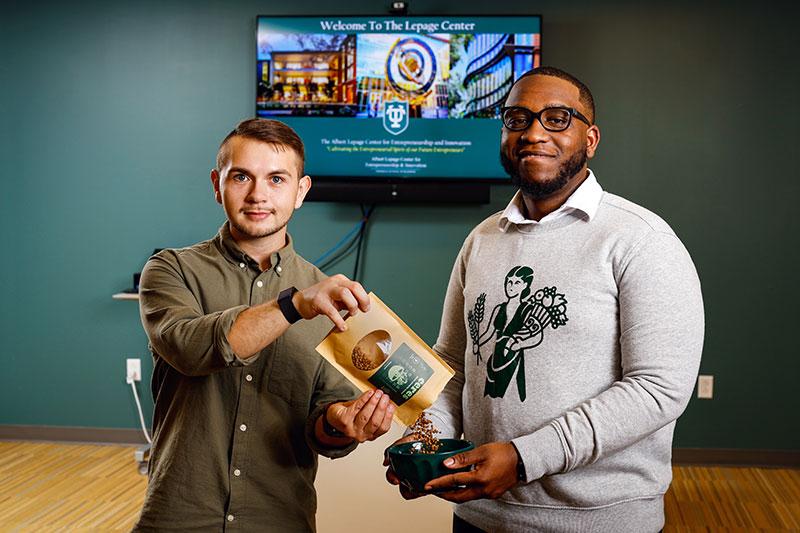MBA student’s cereal startup finalist in national pitch competition

Ceres, the plant protein cereal startup co-founded by Tulane MBA student Rich Simmerman (MBA ’24), has been named one of 13 national finalists in the third annual AWS University Startup Competition.
Sponsored by Amazon Web Services, the pitch contest will award $35,000 in cash prizes and up to $100,000 in AWS credits to university-affiliated startups. The final round of the competition took place on Thursday, Jan. 19, and the winners will be announced the week of January 23.
“To be the only finalist from the Deep South and the only food brand, it’s really exciting,” says Simmerman.
Founded in New Orleans in February 2022, Ceres is the first breakfast cereal made exclusively with plant protein and with no added sugar. Each serving of the crunchy, cinnamon-flavored granules boasts 20 grams of protein and zero grams of sugar.
“We emphasize sustainability for people and the planet in a way that no cereal company has done before,” says Simmerman. “Our cereal is 100% vegan, non-GMO, gluten free and low FODMAP. We wanted to make the most natural yet rewarding cereal for people and the planet, and that’s what Ceres is.”
Simmerman’s career as a cereal entrepreneur began as an undergraduate at Loyola University in New Orleans. He and co-founder Branson Morgan originally planned to develop a quick-service cafe specializing in healthy cereal brands, but they shifted gears in part because they learned how harmful most so-called healthy cereals are.
“Most cereals have 20 grams of sugar in every serving — that’s the average — which is more than 50% of what women are supposed to consume in a day and 40% of what men are supposed to consume,” Simmerman says. “In an age of health consciousness and holding companies accountable, that was kind of shocking to me. That’s where we really got the idea from — discovering how unsustainable cereal is for people.”
In creating a healthier alternative, Simmerman and Morgan opted for plant protein — from soy, pea and hemp — instead of milk-based protein, a decision made as much for its impact on the planet as for its nutritional properties.
“Milk and whey protein concentrate is extremely unsustainable for the environment and it’s generally high emissions whereas our plant-based protein is minimal emissions and considered a sustainable growth aspect long term, so no greenhouse gasses and there’s much less water associated with the growing of non-GMO soy,” Simmerman explains.
Since enrolling in the Freeman School’s PMBA program last summer, Simmerman has been working with the staff of the Albert Lepage Center for Entrepreneurship and Innovation, which connected him with members of its Innovators-in-Residence program for advice and mentoring. Ceres also won the Lepage Center’s Pitch Friday contest in October, earning a spot in the competition’s grand prize round in April.
In August, Ceres won first place and a prize package of more than $100,000 in cash and in-kind services in the Startup St. Bernard pitch competition, the largest pitch event in the Gulf Coast. Simmerman says the company has raised about $200,000 in pre-seed funding as they prepare for their seed round.
Ceres is currently available via the company’s website, enjoyceres.com, and on Amazon, and Simmerman hopes to have Ceres in select locations of Rouses Markets in the near future.
Interested in advancing your education and/or career? Learn more about Freeman’s wide range of graduate and undergraduate programs. Find the right program for you.
Other Related Articles
- NOLA.com: Louisiana venture capital firms, once an afterthought, are big funders of local startups now
- Forbes: Your Pitch Deck Doesn’t Close the Deal - Your Power in the Room Does
- New Orleans startups bet on AI as Tulane expands its survey statewide in 2026
- Lepage Center honors graduating fellows
- Newsweek: Jeff Bezos May Sell up to 25M Amazon Shares
- Business Insider: Trump blasting Amazon over tariff transparency is a warning sign for US retailers
- AP News: Amazon is not planning to break out tariff costs online as White House attacks potential move
- Biotech startup breaks through at Pitch Friday
